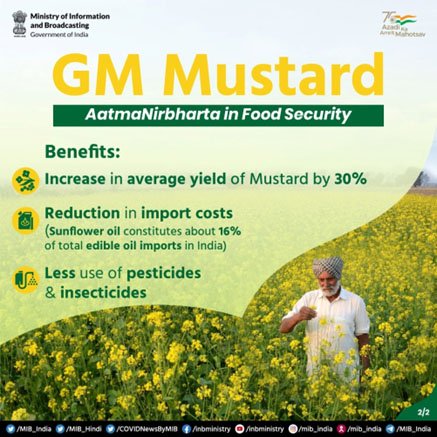GM Mustard
What is GM Mustard?
GM Mustard (DMH-11) is a indigenously developed variety of Herbicide tolerant Mustard, created from Transgenic Technology. It contains two alien genes ‘barnase’ and ‘barstar’ isolated from soil bacterium called Bacillus amyloliquefaciens.
Transgenic Technology– An organism or cell whose genome has been altered by the introduction of one or more foreign DNA sequences from another species by artificial means.
GEAC– Genetic Engineering Appraisal Committee is responsible for appraisal of projects regarding release of genetically modified organisms.
It works under administrative control of Ministry of Environment, Forest and Climate Change
Significance- Mustard is one of the most important edible oil cultivated in around 8-9 million hectares of land in India. GM Mustard can help reduce dependence on edible oil imports.

Benefits of Dhara Mustard Hybrid (DMH-11):
- Increase in per hectare yield by 25-30%
- Reduced cost of food production
- Reduced need for pesticides
Problems with Dhara Mustard Hybrid(DMH-11):
- Threats to biodiversity including targeting of non intended insects
- Benefiting few large seed companies
- Seeds cannot be replanted as GM crops do not produce viable progenies
- Ethical concerns regarding interference in natural organisms intrinsic values
- Mandatory trial results to ensure food and environmental safety, have not been made public
Way Forward:
Seriously addressing all potential risks in a time bound manner so as to ensure that both economic and ecological needs are taken care off.
News- Genetic Engineering Appraisal Committee (GEAC) has allowed the environmental release of GM Mustard (DMH-11) for seed production and testing.
Syllabus- Prelims and Mains; GS-3; Science and Technology

